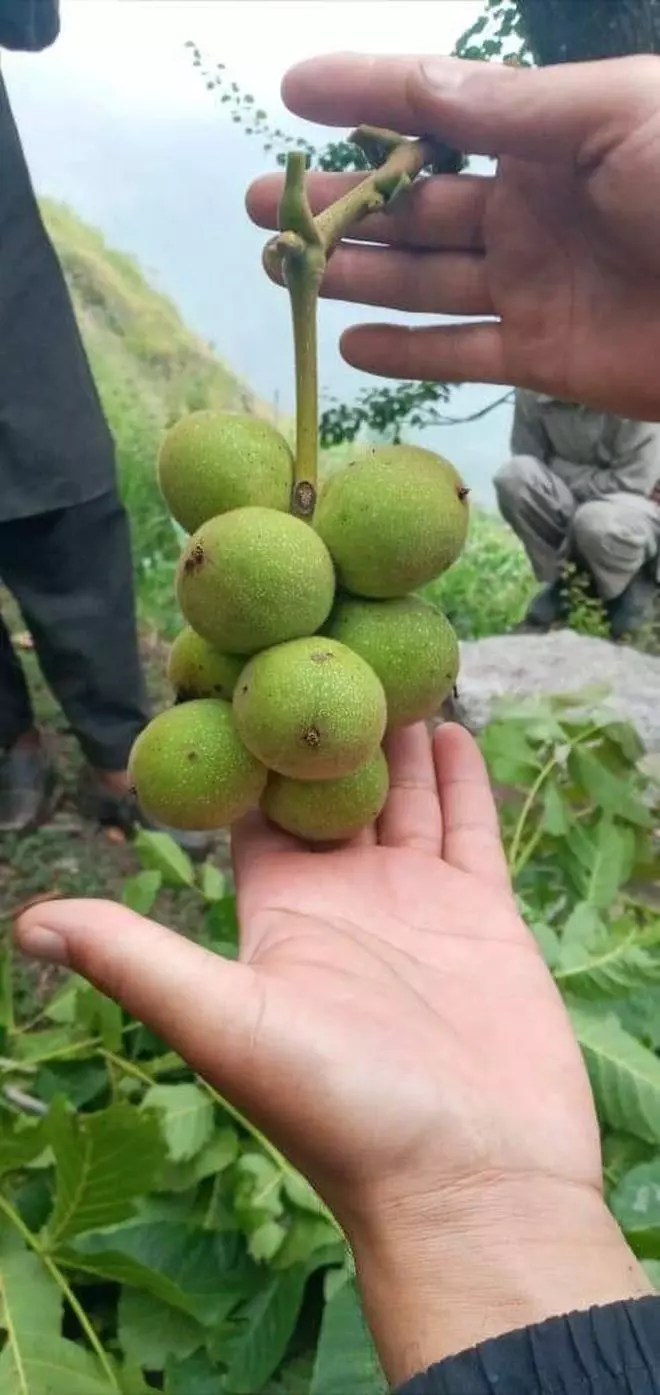Nestled amid awe-inspiring mountains, Gundarna Tagood village located about one-hour winding drive from Kishtwar town in Jammu division, exudes a pure bucolic charm. Within the quaint village lies a vast farm, sprawling 60 kanals across a tough terrain, attracting the attention of both horticulture enthusiasts and researchers.
In 2016, Suneel Singh (39), a retired soldier established a nursery and orchard, which is now home to around 40,000 trees, mostly walnut. His passion for walnut farming led him to experiment with grafting, which resulted in increased yield and reduced tree height. Singh claims to have learned the technique online, besides seeking guidance from horticulture experts.
Singh’s walnut trees reach a maximum height of 20 feet, compared to the 60-70-foot tall conventional trees. The immense height of the trees has led to several accidents, where farmers have lost their lives while harvesting the fruits.
Additionally, they enter the fruit-bearing stage much earlier than the traditional trees. “They enter fruit-bearing stage within 3 years and reach full production in 7 to 8 years,” claimed Singh.
“I cultivate at least 20 walnut selections,” he said. Apart from walnuts, Singh cultivates hazelnuts, pecans and some stone fruits including peach, plum and apricots.
Researchers and experts from Sher-e-Kashmir University of Agricultural Sciences and Technology (SKUAST) visited Singh’s farm and appreciated him for preserving a good collection of walnut selections.

organic production
Walnuts in Jammu and Kashmir have been cultivated using organic farming methods for ages. The walnuts account for around 95 percent of land under organic fruit cultivation in the region. Jammu and Kashmir produce 85,000 lakh and around 1,85,000 lakh tonnes of walnuts annually, respectively.
“Although I use new walnut selections, my produce is completely organic like that of conventional trees,” said Singh.
Underlining the benefits of walnut farming, Singh said that the life span of a walnut tree is 150 to 200 years and the furniture and goods made out of its wood can last for generations.
Cracking under pressure?
The walnut industry of Jammu and Kashmir, which accounts for nearly 90 per cent of India’s total walnut production, is faced with headwinds. Declining prices, imposition of GST and imports from countries like California, Chile and China are some of the key challenges confronting walnut producers.
“Over the past several years, people have lost interest in walnut cultivation. Imported produce forces the local farmers to sell their harvest for a song,” said Haji Bahadur Khan, president of Dry Fruit Association Kashmir.
He said that imposition of 5 per cent GST had put an extra strain on walnut farmers and traders.
In the absence of modern horticulture technologies, Khan added, walnut growers had to rely on conventional varieties.
Over the last few years, however, the government has been encouraging the farmers to plant hybrid varieties of the fruit. In 2021, the government rolled out high-density schemes for various fruits, including walnuts.
Dr OC Sharma, Principal Scientist at Center Institute of Temperate Horticulture, told businessline that they have released 12 new varieties of walnuts for the farmers.